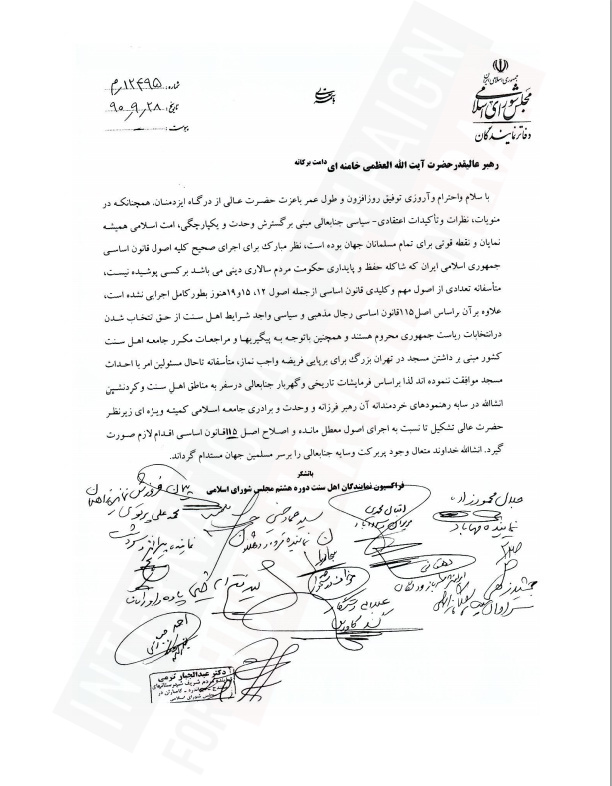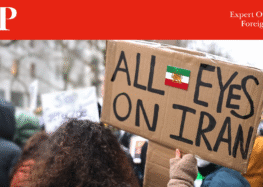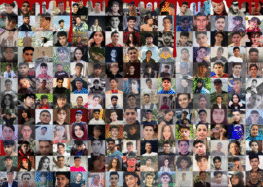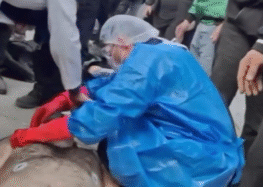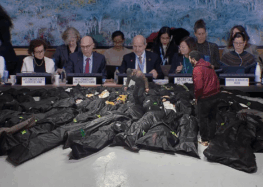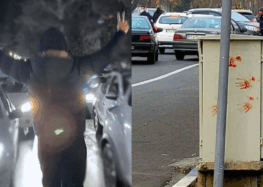Sunni MPs Object to Ethnic and Religious Discrimination in Letter to Ayatollah Khamenei
In a letter addressed to Supreme Leader Ayatollah Khamenei, Sunni members of the Iranian Parliament asked for an end to discrimination against Sunnis, an end to religious limitations for Sunnis, and permission to construct a mosque in Tehran. In this letter, a copy of which was made available to the International Campaign for Human Rights in Iran, Sunni Members of the Parliament also ask Ayatollah Khamenei to review and “correct Article 115 of the Islamic Republic of Iran’s Constitution,” and to end the prohibition of Sunni candidates from participating in presidential elections.
Ayatollah Khamenei, Mahmoud Ahmadinejad, and other Iranian officials have so far never formally responded to any grievances and demands from Sunni clerics and leaders.
In the letter, dated 19 December 2011, members of the Sunni Faction of the Iranian Parliament wrote to Khamenei about the non-implementation of “key and important articles of the Constitution, in particular those principles that refer to religious freedom of the Sunnis and ethnic equality,” and express regret about it. “Unfortunately, many of the important and key articles in the Constitution, including Articles 12, 15, and 19, have not been completely implemented yet. Additionally, Article 115 of the Constitution forbids qualified Sunni political and religious leaders from running in the presidential elections,” the letter states.
Members of the Sunni Faction have additionally reminded Ayatollah Khamenei that Iranian Sunnis have so far been unable to receive permission to build even one mosque in Tehran. They have emphasized that this illegal prohibition continues, adding, “Despite frequent follow-ups, unfortunately the authorities have not agreed to the construction of the mosque.”
The signatories of the letter, Sunni MPs from various regions throughout Iran, point to the statements made Ayatollah Khamenei during his trips to provinces and Sunni-dominated regions, and specifically during his 2009 visit to Kurdistan Province, about religious “equality and brotherhood,” as well as “unity,” ask Khamenei to “form a special committee” to take action on “implementing delayed articles and correcting Article 115 of the Constitution,” and to end the religious and ethnic restrictions and prohibitions imposed on Sunnis.
Article 115 states, “The president must be among religious and political figures and have the following qualifications for elections: Iranian descent, Iranian citizenship, be a wise manager, have a good record and be trustworthy and pious, be faithful and a believer in the principles of the Islamic Republic of Iran and a member of the official religion of the country.” Since Article 12 of the Iranian Constitution defines the official religion of Iran to be Ethna Ashari (Twelver Shiism), Sunnis are prohibited from becoming candidates in the presidential elections.
The Sunni Faction of the Iranian Parliament was established in 2008 by a group of Sunni MPs after religious restrictions for Iranian Sunnis increased, several Sunni clerics were arrested, and security confrontations with Sunnis in different Iranian provinces intensified. Jalal Mahmoudzadeh, MP from Mahabad in Kurdistan Province, is Secretary of the Sunni Faction of the Iranian Parliament.
Signatories of the letter include: Jalal Mahmoudzadeh, representative of Mahabad and Secretary of the Sunni Faction; Peyman Forouzeh, representative of Zahedan; Eghbal Mohammadi, representative of Marivan and Servabad; Abdaljabbar Karami, representative of Sanandaj, Divandarreh, and Kamyaran; Mohammad Ali Partovi, representative of Sardasht and Piranshahr; Saidamad Hosseini, representative of Qorveh and Dehgolan; Said Fatahollah Hosseini, representative of Paveh and Oramanat; Mohammad Reza Sajjadian, representative of Khaf and Rashtkhvar; Mohammad Gheyoom Dehghan, representative of Iranshahr, Sarbaz and Delgan; Abdollah Rastgar, representative of Gonbad Kavoos; Abdolaziz Jamshidzahi, representative of Saravan, Sib Suran, and Zaboli; and Ahmad Jabbari, representative of Bandar Langeh, Bastak, and Parsian.

